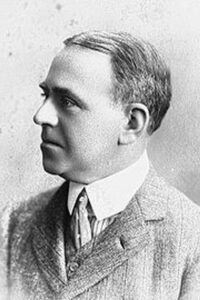
The Devil’s Paw
The two men, sole occupants of the somewhat shabby cottage parlour, lingered over their port, not so much with the air of wine lovers but rather as human beings and intimates, perfectly content with their surroundings and company. Outside, the wind was howling over the marshes, and occasional bursts of rain came streaming against the window panes. Inside, at any rate, was comfort, triumphing over varying conditions. The cloth upon the plain deal table was of fine linen; the decanter and glasses were beautifully cut; there were walnuts and, in a far corner, cigars of a well-known brand and cigarettes from a famous tobacconist. Beyond that little oasis, however, was all the evidence of a hired abode. A safety pin fastened together a hole in the closely drawn curtains. The horsehair easy chairs bore disfiguring antimacassars, the photographs which adorned the walls were grotesque but typical of village ideals, the carpet was threadbare, and the closed door was secured by a latch instead of the usual knob. One side of the room was littered with golf clubs, a vast game bag, and several boxes of cartridges. Two shotguns lay upon the remains of a sofa. It scarcely needed the costume of Miles Furley, the host, to demonstrate that this was the temporary abode of a visitor to the Blakeney marshes in search of sport.
Furley, broad-shouldered, florid, with tanned skin and silvery hair, was still wearing the duck shooter’s high sea boots and jersey. On the other hand, his companion, a tall, slim man with a high forehead, clear eyes, stubborn jaw, and straight yet sensitive mouth, wore the ordinary dinner clothes of civilization. The contrast between the two men might have afforded some ground for speculation about the nature of their intimacy. Furley, a son of the people, had the air of cultivating, even clinging to a specific plebeian strain, never so apparent as when he spoke or in his gestures. He was a Member of Parliament for a Labour constituency, a wise and valuable exponent of the gospel of the working man. What he lacked in the higher qualities of oratory he made up in sturdy common sense. The will-o’-the-wisp Socialism of the moment, with its many attendant “isms” and theories, received scant favour at his hands. He represented the solid element in British Labour politics, and it was well known that he had refused a seat in the Cabinet to preserve absolute independence. He had a remarkable gift of taciturnity, which in a man of his class made for strength, and it was concerning him that the Prime Minister had made his famous epigram, that Furley was the Labour man whom he feared the most and dreaded the least.
Read or download Book
Edward Phillips Oppenheim
Edward Phillips Oppenheim (22 October 1866 – 3 February 1946) was an English novelist, and a prolific writer of best-selling genre fiction, featuring glamorous characters, international intrigue, and fast action. Notably easy to read, they were viewed as popular entertainment. He was featured on the cover of Time magazine in 1927.
Biography
Edward Phillips Oppenheim was born on 22 October 1866 in Tottenham, London, the son of Henrietta Susannah Temperley Budd and Edward John Oppenheim, a leather merchant. After attending Wyggeston Grammar School until the sixth form in 1883, his family’s finances forced him to withdraw and he worked in his father’s business for almost twenty years. His father subsidized the publication of his first novel, which proved just successful enough to break even. He published five of his novels between 1908 and 1912 under the pseudonym “Anthony Partridge”.
Around 1900, Julien Stevens Ulman (1865–1920), a wealthy New York leather merchant who enjoyed Oppenheim’s books, bought the leather works and made him a salaried director to support his writing career.
He quickly found a successful formula and established his reputation. In 1913, John Buchan, launching his career as a suspense novelist, called Oppenheim “my master in fiction” and “the greatest Jewish writer since Isaiah”. As early as that year, his publishers were bringing out new editions of some of his earlier works to meet, in the words of one trade publication, “the insatiable demand of the public for more stories by him”. It added: “Readers of the author’s recent books will find these first stories of life sketches full of interest, their very crudeness being positively amusing in light of his present finished craftsmanship.”
In 1892 Oppenheim married an American, Elise Clara Hopkins of Easthampton, Massachusetts. They lived in Evington, Leicestershire in what is now The Cedars pub until the First World War and had one daughter. During that war, he worked for the Ministry of Information.
He described his method in 1922: “I create one more or less interesting personality, try to think of some dramatic situation in which he or she might be placed, and use that as the opening of a nebulous chain of events.” He never used an outline: “My characters would resent it.” When he needed villains for his diplomatic and political intrigues he drew on Prussian militarists and anarchists, enough for one reviewer to lament “the baldness of his propaganda”. For example, in A People’s Man (1915), a socialist discovers that his movement is secretly run by German spies.
A 1927 review in The New York Times said he “numbers his admirers in the hundreds of thousands and has one or more of his books on a prominent shelf in almost every home one enters”. He appeared on the cover of Time magazine on 12 September of that same year.
Reviews for his work treated them as entertainment with only a slight relationship to the mystery genre. In 1933, a review of Crooks in the Sunshine explained that “Mr. Oppenheim’s crooks are so polished that they have no difficulty in moving in the very best society…. There is very little mystery in this book, but there is dress-suit crime galore.” In 1936, a review of A Magnificent Hoax, his one-hundredth novel, said: “The hoax is on the reader, who is led, through nearly 300 pages, only to find that nothing very terrible has happened. The explanation takes a bit of believing, but since it extricates several very nice people from what looks like a nasty mess, one is willing to let that pass.” The Shy Plutocrat, published early in World War II, was “a good tale to take your mind off your worries”. Readers came to expect familiar themes, “the peculiar Oppenheim blend of dispatch-box atmosphere, femmes fatales, double traitors, and a tight plot”. In mid-career, The Great Impersonation (1920) was called “his best work”.
Along with dozens of novel and short story collections, he produced an autobiography, The Pool of Memory, in 1942.
Oppenheim’s literary success enabled him to buy a villa on the French Riviera and a yacht, then a house in Guernsey, though he lost access to this during the Second World War. He regained the house, Le Vauquiedor Manor in St. Martins, after the war and died there on 3 February 1946. His wife died there on 25 November.
An assessment that appeared in The New York Times upon his death said: “As he recalls in his pleasant and modest autobiography, all his books were easy to write. They were equally easy to read, especially on a summer vacation when escapist literature is most welcome.” He composed by dictating to a secretary and once produced seven works in a single year. His social set included the characters that populated his novels, where he created “a glamorous world of international intrigue, romance, and plushy society galloping along in swift action and suspense”. One academic study calls him “a talented entertainer”.






